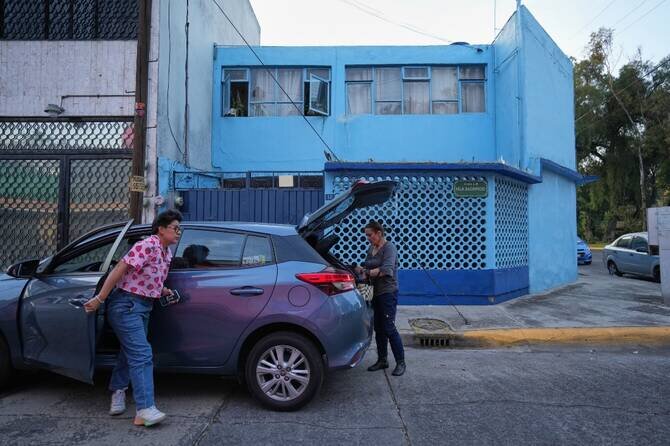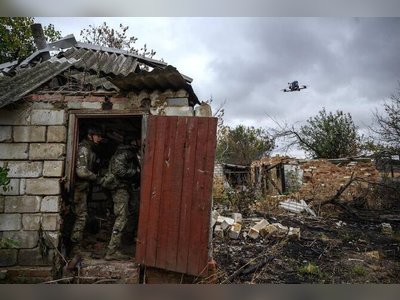
Mexican Women Find Safety in All-Female Ride-Sharing Network Amidst Rising Sexual Harassment Concerns
AmorrAs provides safe transportation and support for women facing endemic sexual harassment on public transit and ride-hailing services.
MEXICO CITY: In a society where sexual violence against women is alarmingly prevalent, ridesharing apps have become yet another source of danger.
For countless Mexican women, the ordeal ends as they step into an all-women ride-sharing network called AmorrAs, created to combat the endemic problem of harassment on public transit and by drivers of traditional taxi services.
AmorrAs was founded in 2022 by Karina Alba following the tragic murder of Debanhi Escobar, a young woman who was killed after stepping out of a taxi.
The network now has more than 20 female drivers, also known as 'ally' drivers, who ferry over 2,000 women per year, providing them with safe rides through Mexico City and its suburbs.
The network requires passengers to schedule rides in advance for security reasons, and the price varies based on distance.
Women receive a message with their driver’s name, number, and a reassuring pink heart emoji before each ride.
The service not only provides transportation but also support and a sense of safety that many Mexican women have been denied in public spaces.
The issue of sexual harassment has come to light once again in Mexico following an incident where President Claudia Sheinbaum was groped by a man on camera.
In response, she announced plans to make sexual harassment a crime nationwide, aiming to facilitate the reporting process for women who often face skepticism and disbelief when they report assaults.
The statistics are alarming: over 61,713 sex crimes were reported in Mexico so far in 2025, including more than 8,700 cases of sexual harassment.
These numbers, however, represent only a fraction of actual incidents as many women do not report their experiences due to stigma and lack of credibility afforded to them by authorities.
To tackle these systemic issues, organizations like AmorrAs emerge as vital lifelines for women navigating an environment where public transport and ride-sharing services are not safe.
The network's operations offer a stark contrast to the broader societal problem, showcasing how grassroots efforts can empower women to reclaim their freedom of movement in a society marred by gender-based violence.
The founders of AmorrAs, along with other advocates and legal experts, emphasize that the issue of violence against women is deeply rooted in cultural machismo and systemic inequality.
They call for justice and accountability from authorities, urging them to address these problems with seriousness and professionalism.
For countless Mexican women, the ordeal ends as they step into an all-women ride-sharing network called AmorrAs, created to combat the endemic problem of harassment on public transit and by drivers of traditional taxi services.
AmorrAs was founded in 2022 by Karina Alba following the tragic murder of Debanhi Escobar, a young woman who was killed after stepping out of a taxi.
The network now has more than 20 female drivers, also known as 'ally' drivers, who ferry over 2,000 women per year, providing them with safe rides through Mexico City and its suburbs.
The network requires passengers to schedule rides in advance for security reasons, and the price varies based on distance.
Women receive a message with their driver’s name, number, and a reassuring pink heart emoji before each ride.
The service not only provides transportation but also support and a sense of safety that many Mexican women have been denied in public spaces.
The issue of sexual harassment has come to light once again in Mexico following an incident where President Claudia Sheinbaum was groped by a man on camera.
In response, she announced plans to make sexual harassment a crime nationwide, aiming to facilitate the reporting process for women who often face skepticism and disbelief when they report assaults.
The statistics are alarming: over 61,713 sex crimes were reported in Mexico so far in 2025, including more than 8,700 cases of sexual harassment.
These numbers, however, represent only a fraction of actual incidents as many women do not report their experiences due to stigma and lack of credibility afforded to them by authorities.
To tackle these systemic issues, organizations like AmorrAs emerge as vital lifelines for women navigating an environment where public transport and ride-sharing services are not safe.
The network's operations offer a stark contrast to the broader societal problem, showcasing how grassroots efforts can empower women to reclaim their freedom of movement in a society marred by gender-based violence.
The founders of AmorrAs, along with other advocates and legal experts, emphasize that the issue of violence against women is deeply rooted in cultural machismo and systemic inequality.
They call for justice and accountability from authorities, urging them to address these problems with seriousness and professionalism.









